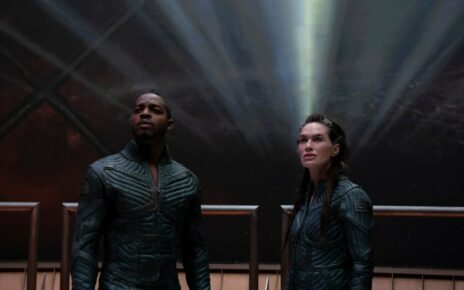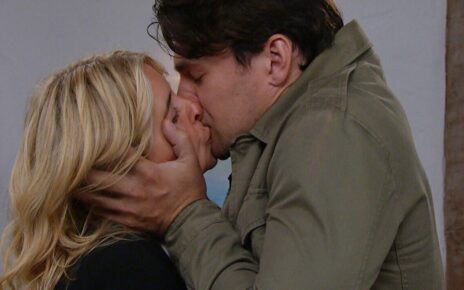It’s 1994, and the people of Northern Ireland are nearly three decades into a violent conflict known as the Troubles. Civilians — thousands of which died during the fray — are generally divided between Protestant unionists, who want to keep the country under United Kingdom control, and Irish Catholics, who call for a united Ireland. Day-to-day life in Derry (or, as crown loyalists call it, Londonderry) involve armed military checkpoints, customary bomb disposals, and the constant hum of danger. Family members are in prison. Others are dead. An end to the Troubles is in sight, but for the teenage girls attending Our Lady Immaculate College, this is the only life they’ve ever known. That it may come to an end right as they graduate only instills further anxiety over the responsibilities of adulthood.
This is “Derry Girls” — or, at least, a version of “Derry Girls” if viewed through a popular storytelling vantage point; a version where the pain, fear, and trauma associated with wartime (even a “low-level war,” as it was called) takes precedence over individual wants and desires; a version where audiences are regularly reminded that what they’re watching carries the weight of history, truth, and concepts bigger than little old you and me.
As Sister Michael would say: Thank Christ that’s not the version of “Derry Girls” we got.
Created by Lisa McGee, the UK production (picked up by Netflix) certainly acknowledges everything listed above. Gun-toting paramilitary officers are everywhere — boarding the girls’ bus to school or standing guard on their way home. Bombs are oft-discussed and even detonated (though, in fairness, Michelle’s red bag of booze was only masquerading as a bomb). A terrorist even stows away in the Quinn family car, looking for a clandestine trip across the border. But McGree uses these drastic perils not as a focal point, but a framework for her coming-of-age comedy. This rambunctious group of friends simply want what all teenagers want: to have a good time, their troubles — or the Troubles — be damned.
By elevating a shared formative experience over its dour surrounding circumstances, McGee and her team have made one of TV’s funniest sitcoms — one that, after wrapping its third and final season this weekend, ha sensured an enduring legacy. Filled with inspiration, optimism, and so, so many laughs, “Derry Girls” is endlessly re-watchable in a way its downer “dramedy” doppelgänger never could be.
Beyond McGee’s uproarious writing — definitively described as “bubblegum punk” by James Poniewozik in The New York Times — credit must be given to the cast. “Derry Girls” pivots around Erin Quinn, played by Saoirse-Monica Jackson with an expressive elasticity that would make Jim Carrey jealous. The 16-year-old aspiring author is the daughter of Mary (Tara Lynne O’Neill) and Gerry (Tommy Tiernan), no-bullshit parents who are embarrassingly proud of their rhyming names (“Mary and Gerry from Derry!”) and all the more endearing because of it. They share a house with Erin’s cousin Orla (Louisa Harland), Aunt Sarah (Kathy Kiera Clarke), and grandpa Joe (Ian McElhinney), in a bursting residence — where even words have to fight for space during the family’s bristling, boisterous conversations — that routinely makes room for Erin’s school friends: Clare (Nicola Coughlan), Michelle (Jamie-Lee O’Donnell), and her British cousin, James (Dylan Llewellyn).
With an invaluable assist from Sister George Michael (Siobhán McSweeney), the ensemble displays a crackling chemistry, as well as a vivid understanding of their individual roles. Coughlan’s Clare can lose her shit with the best of them, emitting an ear-piercing conniption usually triggered when her compulsion to play by the rules butts heads with her loyalty to a recalcitrant crew. O’Donnell, as the cocksure ringleader Michelle, deploys the best Irish slang imaginable: “Cracker” and “ride” will be part of fans’ vocabularies for years, and her sheer enthusiasm for the ubiquitous “motherfuckers” catches on with everyone but Erin. Clarke’s Aunt Sarah makes for an ideal lovable dumb-dumb, McElhinney’s stubborn Joe knows just how to soften his iron fist, and it’s a credit to Tiernan that Gerry’s prevailing exasperation only grows more warmly ridiculous over time.
I could go on, but odds are you already appreciate the cast’s impeccable specificity and stirring camaraderie. Such exemplary rapport is a cornerstone of the series, and Season 3, as final seasons tend to do, optimizes the stars’ established skills — I’ll never forget Jackson’s flabbergasted face or O’Donnell’s unreserved lust upon walking in on the hot plumber — while pushing the characters into new territory. Had you told me prior to seeing the last seven episodes that they include multiple deaths, a surprise sibling serving time for murder, and an elongated series finale that features not one, but two considerable time jumps, I would’ve been worried. Not because there’s any question as to what this cast can handle, but because, after three years between seasons, perhaps “Derry Girls” finally gave in to its dramatic groundwork and crafted a goodbye with comedy in the backseat.


“Derry Girls”
Courtesy of Netflix
Plenty of modern sitcoms take a serious sojourn. Just look at a few of this year’s Emmy nominees for Best Comedy: The happy-go-lucky “Ted Lasso” deals with suicide in Season 2. Bill Hader went “dark as hell” during the “Barry” Season 3 finale. I’m not sure “The Marvelous Mrs. Maisel” has ever featured more comedy than drama — and she’s a stand-up comic! None of this is to minimize what these shows have accomplished. “Barry,” in particular, squeezes in a stunning number of actual jokes amid the bloodshed and betrayals. But even with consistently funny comedies like “Curb Your Enthusiasm” and “What We Do in the Shadows” earning widespread recognition, it still feels rare to see a contemporary streaming sitcom stick by its sense of humor from start to finish.
“Derry Girls” does just that. Rather than ramp up a “teens in crisis” narrative or magnify the fear over the uncertainty of their impending adulthood, McGee’s farewell is a hopeful one. The finale hinges on a key day in history — voting on the Good Friday Referendum — but despite a difficult blow dealt to one of our leads in the penultimate episode, the ending is spirited, smart, and still funny. “Derry Girls” never dismisses the hardships faced across Ireland during the Troubles. These final episodes even go out of their way to make sure its effects can be seen within Erin, Clare, and Michelle’s character — it is all they’ve known, after all. But just as the Quinn family persevered in spite of their country’s ongoing chaos, the sitcom never forgets itself, either. One of Erin’s overarching speeches finally hits the mark. A long lost letter arrives at its intended destination. Smiles stretch from the Irish Sea to the North Atlantic. And that is no wee blessing.
“Derry Girls” Seasons 1-3 are available on Netflix.
Source: Read Full Article


